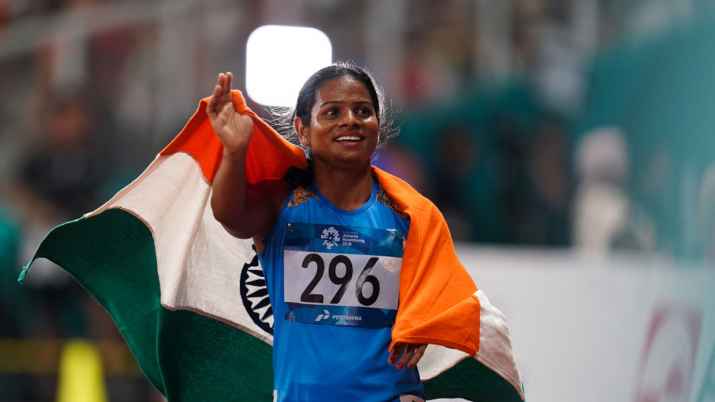Dutee Chand: The woman who broke records and stereotypes

The story of India’s fastest woman is quite different from those of other mainstream athletes in India. 24-year-old Dutee Chand’s extraordinariness comes not just from her record-breaking speed on the track, but also her persistent fight against patriarchy.
Born in an underprivileged family in Chaka Gopalpur, a village in Odisha’s Jajpur district, Chand’s journey is one filled with hardships. Her gender and sexuality had been a matter of discussion ever since her childhood. As a girl who ran on the banks of the Brahmani river in Orissa, Chand was called a ‘tomboy’ for having aspirations only a boy can have.
Chand went on to become became a national champion in the under-18 category in 2012, and also become the first Indian to reach the final of a global athletics 100 metres final, when she reached the final in the 2013 World Youth Championships. In June 2014, she won two gold medals at Asian Junior Athletics Championships.
At the age of 17, Chand was already been called “a sure shot Olympic medallist.” However, a huge blow to her career came in 2014 when she was effectively banned from competing as a female because of high testosterone levels in her body, a clinical condition called ‘hyperandrogenism’. Soon, people started questioning Chand’s gender identity itself, and the International Association of Athletics Federations (IAAF) essentially asked her to get surgery and hormone-replacement treatment done to “correct” the body.
Chand refused to comply and decided to challenge this decision before the Court of Arbitration for sports. After four years since she was banned, she won the case and IIAF withdrew the rules. He case brought justice to countless other female athletes who faced a similar ban for something that’s present naturally in a human body. This was a victory not just over the ban, but also all the people who bad-mouthed her and questioned her character and her body.
Chand went on to win many more medals, and in a historical landmark in May 2019, she came out as a homosexual, becoming India’s first openly gay athlete. “I believe everyone should have the freedom to be with whoever they decide they want to be with. I have always supported the rights of those who want to be in a same-sex relationship,” Chand said. To many, this declaration was a watershed moment in Indian sports, however, back home in Gopalpur, the villagers condemned her statement.
The lack of support that Chand got from her family and villagers tells us about the grim reality of how not much has changed even after homosexuality was decriminalised in 2018. However, it’s also important to see the amount of strength Chand’s coming out story has given to others, encouraging people to embrace their real identity with pride. Chand’s refusal to leave her partner even amidst all the pressure from her family, her decision to remain true to herself gives hope to many others facing similar ostracism.
Chand, however, says that she never aspired to be a role model for others. “I only did all of that to stand up for myself, to fight for my own rights,” she said. “Why should I take those medicines? Why should I struggle? I have no problem living with this body, so who are they to tell me what’s right or wrong? And if this helps people, I never want to stop.”
Through her journey, Chand has emerged as an inspiration for the LGBTQIA+ community, which is still fighting for acceptance in a conservative nation like India. More power to her, and everyone who is fighting a similar battle.
Article by Nikita Pradhan, creative committee member of AIQA



